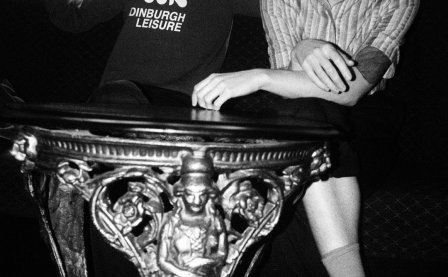Who are you? Do you have an intrinsic identity? And if you do, how would you describe it? ******** quite literally refuse to define themselves, and on The Drink, they illustrate how facile it would be to try. Does your job define you? Fine then: they’re zookeepers, but not goalkeepers; art dealers, filmmakers, school teachers, but not midfielders; headmasters, wholesalers, stockbrokers. ******** are comedians; you can ask their folks. Maybe you can form an identity through what you buy. In that case, they identify with Budweiser, newspapers, ring binders, Schweppes Bitter Lemon. If you can’t get a job and therefore can’t buy anything, you can always form an identity online. ******** tried this too, and 45 people on Reddit suggested suicide. No? Then why not just get a job? Why not try to be useful? Why not go buy a new scooter?
******** don’t quite refuse to say who they are — not completely. They are called Ω and Ailie Ormston. Otherwise, they remain taciturn. The Drink is their first and, they claim, final record. They originally released it by posting it to YouTube. On the record, there are guitars and bass and drum machines and keyboards. But it would be wrong to call Ω and Ormston guitarists or bassists or producers, as they renounce authorship or individuality within the band.
******** deliver their accounts of late capitalism with dead-eyed detachment, playing their instruments with committed amateurishness. But under this veneer of apathy, these are protest songs. “Trish” is about Tricia Marwick, the former Presiding Officer of the Scottish Parliament and member of the Scottish National Party, whose platform includes Scottish independence. Ω sings that “The judicial system, it has failed/ When the television went up for sale/ It was then the country fell/ And then the judges yelled/ We need Tricia.” Marwick stepped down as P.O. in 2016, a month before the Brexit referendum. In 2014, when Scotland’s referendum for independence failed while Marwick was in office, the question of the possibility of Scottish membership in the European Union was among the reasons that many voted not to break from the UK. The British government refused to petition for advice on the issue from the European Commission before the referendum, leaving the matter doubtful for voters. Now that England has voted to leave the EU, many Scots feel betrayed, and Scottish independence is again a pressing concern (Scots overwhelmingly voted “Remain”). “Scottish Water,” similarly, wonders what will happen to Scotland’s natural resources after the UK’s trade alliance with the EU is severed. Ormston complains that the water is “Too harsh in Halford, too weak in Worthing/ I must return to my highland spring.” She intones, “Please vote ‘Remain’ for water’s sake/ If we leave, they will surely take our fresh supply.” What’s at stake is self-sufficiency; whether one can participate in a transparent democratic process; whether one can control something as basic as a water supply.
The Drink sounds like depression and ennui and inescapable irony. The paradox is that to make a record this consciously political, you’d have to be a bit in earnest. So what is the relationship between ********’s slacker pose and their politics? They are inextricably intertwined, in that they reverse the rock trope of the performer-persona to remind us that we all create personas, all the time, and that the material with which we do so is increasingly meager. The foundations of the previous generation’s sense of identity — career, commodity, community — have been outsourced, overpriced, and moved online. And so ********’s detachment from these things is a pose calculated for survival. But what isn’t?
More about: ********


